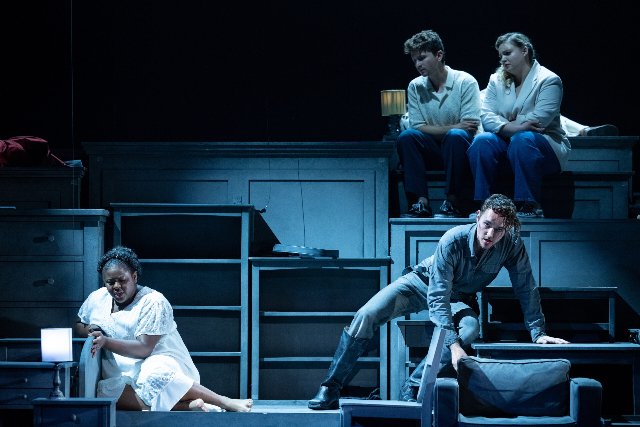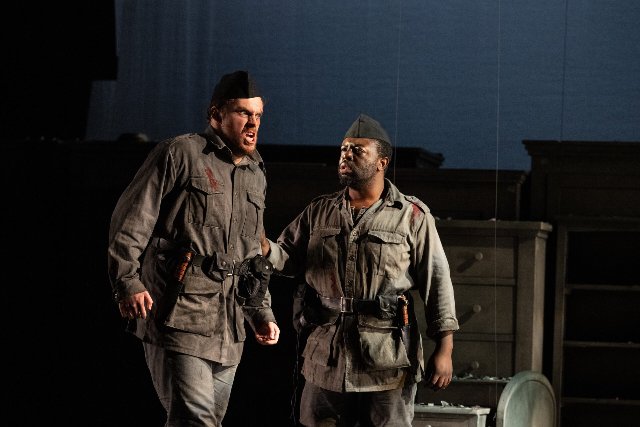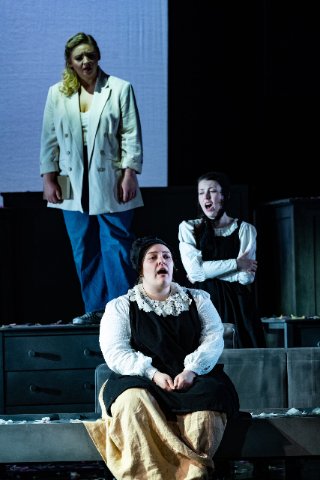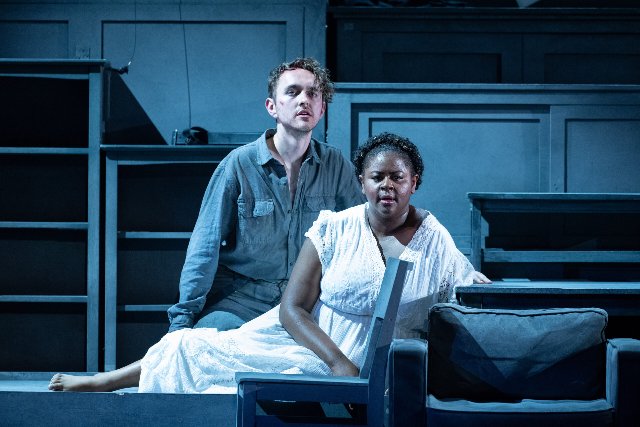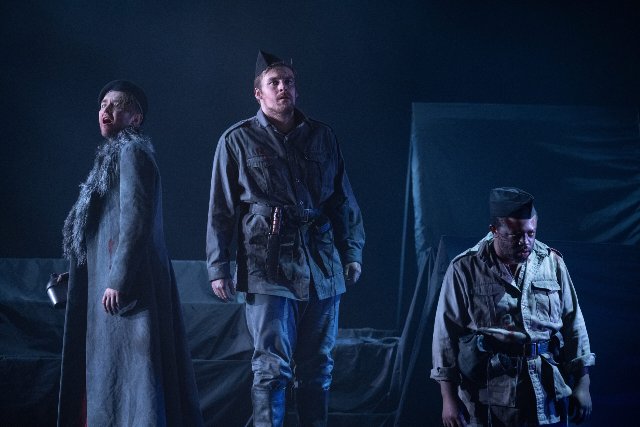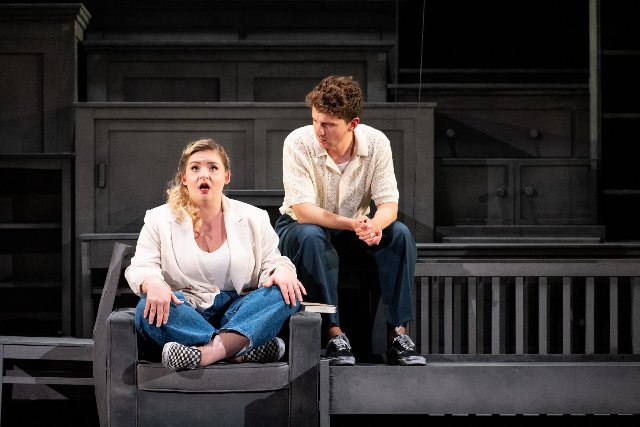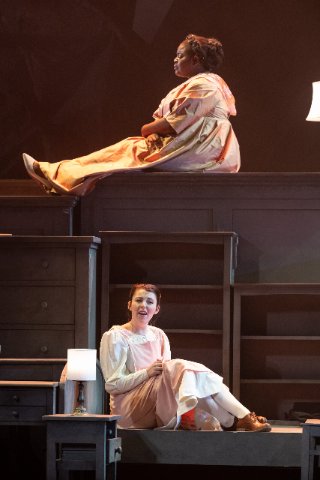The Rape of Lucretia
The Act That Gave Rise to the Republic of Rome
By: Victor Cordell - Jul 14, 2023
In the midst of its 2023 Merola Summer Opera Festival, a program for gifted singers artistically associated with San Francisco Opera, it offers a fully-staged production of Benjamin Britten’s “The Rape of Lucretia.” The opening performance was powerful and engrossing, led by a strong cast of eight singers from the illustrious training ground.
When a group produces only one opera in a season, the question arises how the selection was made. In this era of “Me, Too,” much analysis is being conducted of the themes in operas. Clearly, if operas such as “Madame Butterfly,” “Don Giovanni,” “Rigoletto,” “Abduction from the Seraglio,” and scores of others were written today, modern sensitivities would demand different treatments of themes now deemed offensive.
“The Rape of Lucretia” fits in that category but was chosen largely because of the themes, with the idea of exposing artists to such materials in a safe and supportive environment. Given that objective, it is somewhat surprising that the rape scene, which could have been totally enacted behind a curtain, is rather physically depicted. In addition to the rape, the text is full of misogyny. Junius declares that “Virtue in a woman is lack of opportunity” and Prince Tarquinius says that “The only girl worth having is wine.” Note, however, that Lucretia’s husband, Collatinus, did not share this sentiment. Fortunately, the program’s social objective was accomplished while presenting an otherwise interesting work.
Its mid-century, modern musicality does not break barriers, but it is highly listenable. All eight roles provide significant stage and singing time for each performer, giving ample opportunity for each to show well – and they do. None of the arias or ariosos are memorable, but two quartets and the septet finale are very involving.
The opera is based on history. Prior to Rome’s becoming an empire, it was ruled by kings. In the 6th century BCE, the tyrant Lucius Tarquinius Superbus was the last king, and his tumultuous reign was finally toppled by actions of his son Tarquinius.
In the opera, Roman officers, including Tarquinius, who are in a military camp wager whether their wives have remained constant. Investigations prove that the wives of all of the men in the discussion have had indiscretions, with one exception. Lucretia has remained faithful. Tarquinius is determined to corrupt her morals. Returning to Rome, his amorous advances toward Lucretia are repelled, and he forces himself on her. Although not dealt with in the opera, this incident was the crowning blow to the king’s reign, and his overthrow led to the period of the Republic of Rome.
This early piece, orchestrated for 13 instrumentalists, is the first of Britten’s chamber operas. Many who are familiar with the composer’s life will know that he often wrote lead parts for his life partner, operatic tenor Peter Pears, who was indeed in the cast of the opera’s premiere. At first blush, one might think that Pears was shortchanged in being cast as Male Chorus. However, this is the sole tenor role and the largest part in the work, narrating the storyline and the thoughts of the men. Rather than a role as a talking-head, stoic sentinel, the Male Chorus is demonstrative, emotional, highly mobile, and interactive with his female counterpart. Indeed, some would argue that a weakness of the libretto is that storytelling by the Choruses dominate the action.
In this Merola realization, impeccably-voiced Chance Jonas-O’Toole excels as Male Chorus with full vocal and acting ranges. Caroline Corrales as Female Chorus is likewise a strong presence with an exciting voice. In the other two large roles, full-throttle baritone Samuel Kidd is the devious Tarquinius and silken-warm-voiced mezzo Natalie Lewis is the righteous Lucretia.
Other performers are James McCarthy as Collatinus, Cameron Rolling as his colleague Junius, and as Lucretia’s attendants, Olivia Prendergast is Lucia and Simona Genga is Bianca. As noted, the voices are accurate throughout, but at least three singers have difficulty at the low ends of their tessituras when competing with the small orchestra ably conducted by Judith Yan.
Director Jan Essinger’s staging is simple yet striking. Sonja Füsti’s sets are monochromatic gray. In the camp scenes, gray sheets draped over objects comprise the set. In Lucinda’s home, the sheets are lifted to reveal a stage full of gray furniture pushed together as if in storage. The somber notes are appropriately accentuated by David Robertson’s dim lighting and Christine Cook’s contemporary drab costuming.
Ronald Duncan’s libretto teems with literacy, blessed with intelligent conversation and an array of rich metaphors and references. If you have to go to your dictionary to look up the word moiety (used to partially rhyme with anxiety), you get the picture. Unlike many operas with convoluted storylines or leaps of logic, this one plays out clearly and concisely with one exception.
A conceit employed that rings false is the Christianization of the text. The Choruses are presented as Christian observers in order to needlessly introduce notions of redemption, and in this interpretation, resurrection. The effect of the dual timeline results in a sense of anachronism, especially when the Choruses are singing with historic figures from centuries earlier.
Although “The Rape of Lucretia” is not among Britten’s oft performed works, its assets are abundant, and Merola offers a fine rendering of this underperformed opera.
“The Rape of Lucretia” is composed by Benjamin Britten with libretto by Ronald Duncan and is produced by Merola Opera Program and performed at Herbst Theatre in War Memorial Veterans Building, 401 Van Ness Ave., San Francisco, CA through July 15, 2023.

